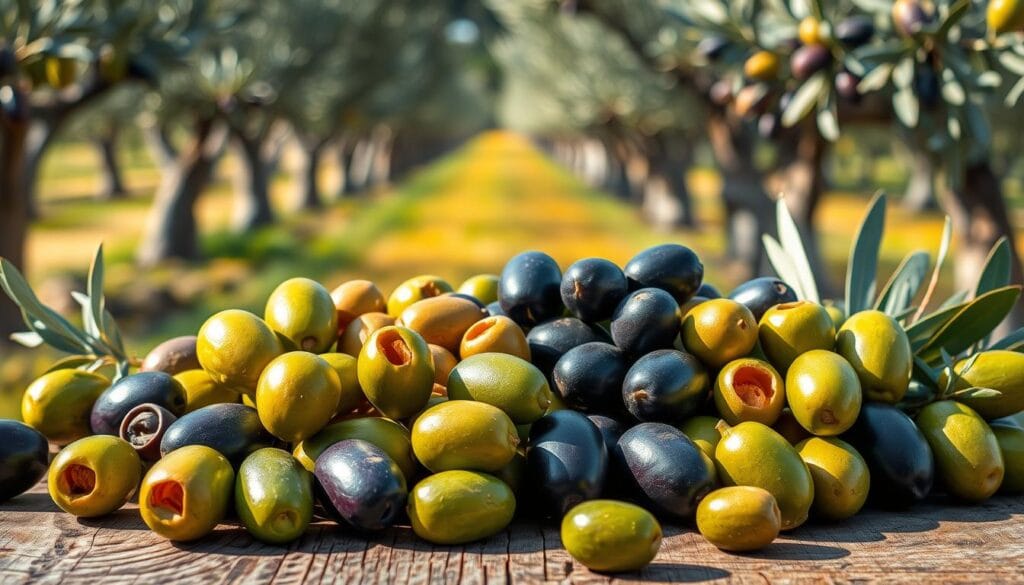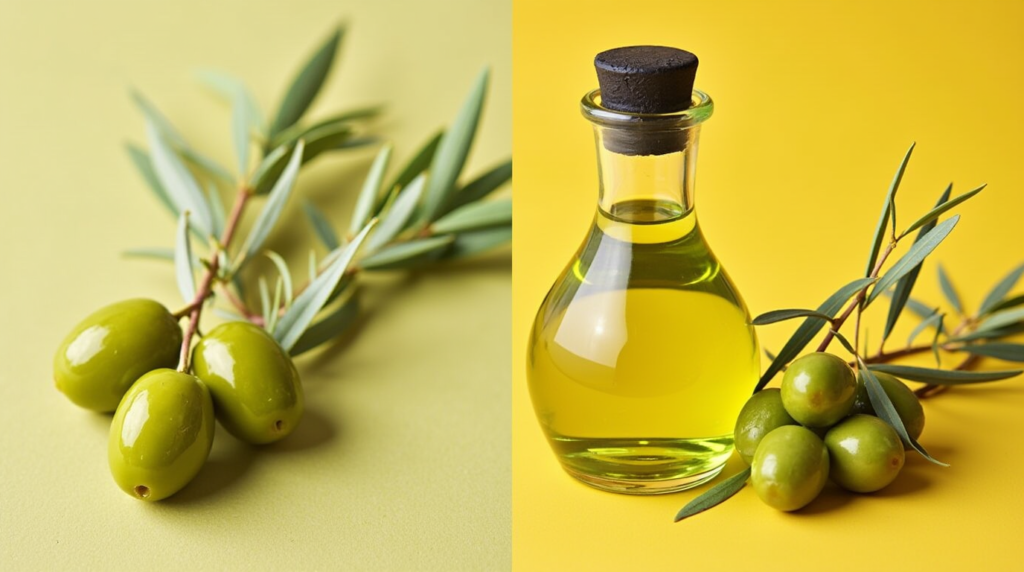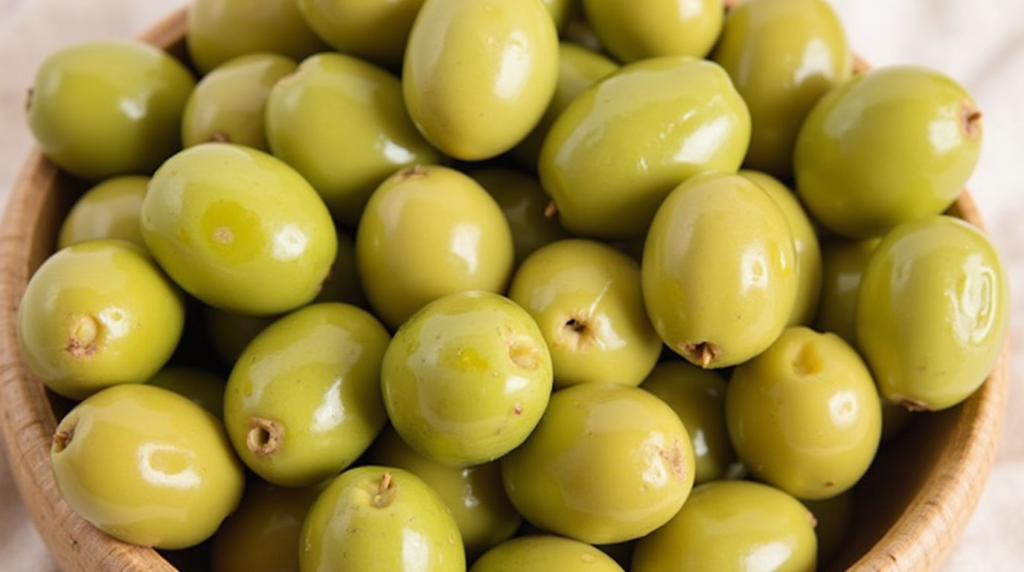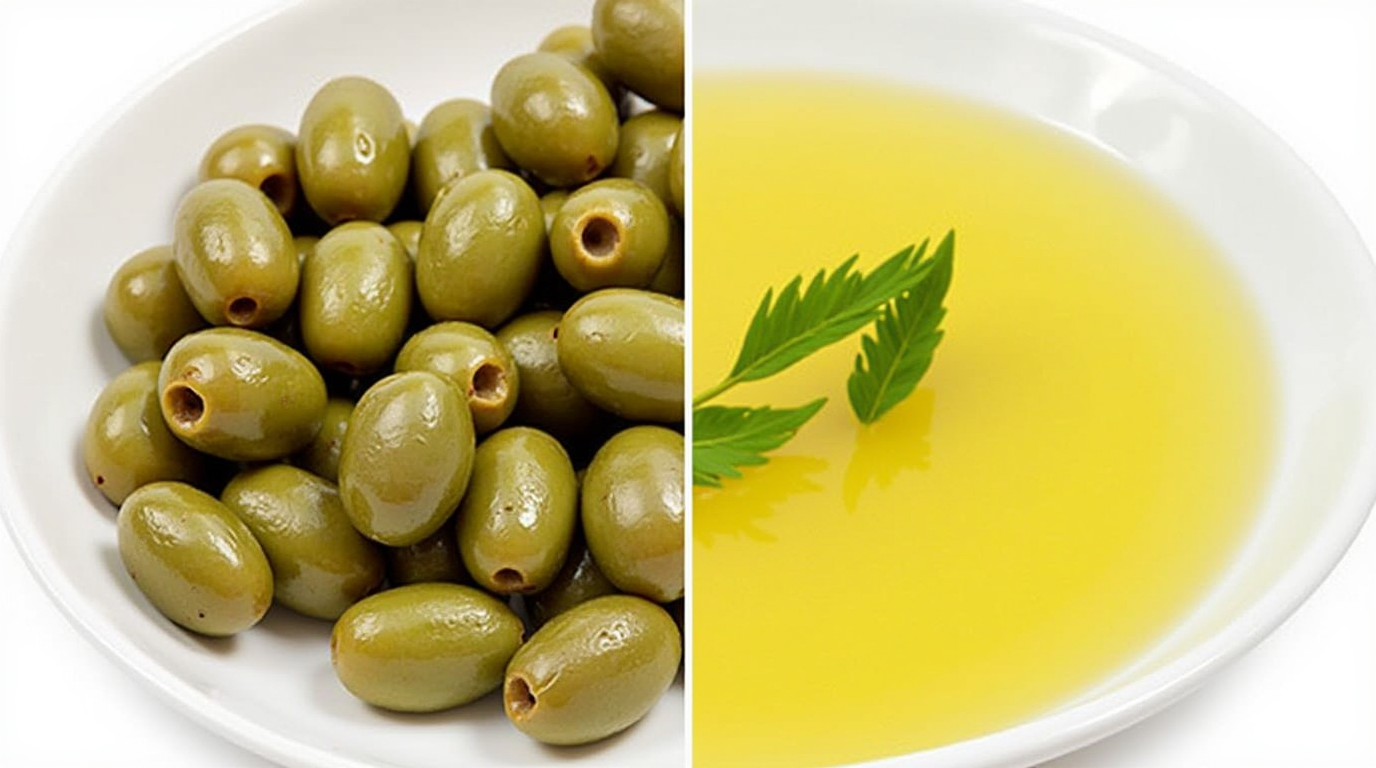Why are olives good for you? How Healthy Are Olives? A Complete Guide to Their Benefits
Imagine sitting at a sunny dinner table, munching on olives with family. These small, salty treats are more than just a snack. They’re full of nutrients. If you’re curious about olives’ health benefits, you’re in for a treat. They’re packed with fats that protect your heart and antioxidants that fight inflammation.
Olives are tiny but mighty. A tablespoon has only 18 calories but is rich in fiber, healthy fats, and minerals. They also contain antioxidants like oleocanthal, which is similar to ibuprofen. This is why people who eat Mediterranean diets often have lower risks of chronic diseases. But what do these numbers really mean for our health?
Table of Contents
The Fascinating World of Olives: An Introduction
Olives have been around for thousands of years, influencing cultures and food. They bring a taste of tradition and the benefits of eating olives to our tables. From ancient times to today, their journey is as flavorful as their taste.

The History and Cultural Significance of Olives
Olives started in the Mediterranean, with history dating back to 3000 BC in Crete. Ancient Greeks used them to crown athletes, symbolizing peace and victory. Today, they’re key to the Mediterranean diet, linked to long life and heart health. Their cultural impact is seen in olive oil ceremonies and festivals.
Different Varieties of Olives You Should Know
There are over 150 olive varieties around the world. Here are some top ones:
| Variety | Flavor/Texture | Best Uses | Nutritional Highlights |
|---|---|---|---|
| Kalamata | Briny, plump | Salads, pastas | Rich in antioxidants, heart-healthy fats |
| Castelvetrano | Creamy, buttery | Tapas, spreads | High in vitamin E, fiber |
| Halkidiki | Crunchy, salty | Stuffed with almonds, cheeses | Monounsaturated fats, anti-inflammatory compounds |
Black vs. Green Olives: What’s the Difference?
Green olives are picked early, with a firm texture and tangy taste. Black olives ripen longer, becoming softer and sweeter. Their olive nutrition facts differ too: darker olives have more antioxidants. Pick based on taste and health goals.
Olive Nutrition Facts: What’s Inside These Small Fruits?
Discover the olive nutrition facts that make these small fruits a nutritional powerhouse. Black and green olives offer different benefits. Both are rich in healthy fats, fiber, and antioxidants. Let’s dive into their nutrient profiles to understand why are olives good for you.
| Nutrient | Black Olives (100g) | Green Olives (100g) |
|---|---|---|
| Calories | 116 | 145 |
| Healthy Fats | 9.3g unsaturated | 13.3g unsaturated |
| Fiber | 1.6g | 3.3g |
| Vitamin E | 1.65mg | 3.81mg |
| Sodium | 735mg | 1,556mg |
Black olives have fewer calories and sodium. Green olives are high in vitamin E and fiber. Both are low in sugar and protein. Their fats are mostly monounsaturated, which is good for the heart.
- Fats: Over 90% of their fats are unsaturated, aiding heart health.
- Fiber: Green olives boost digestion with 3.3g per 100g, easing constipation.
- Vitamin E: Acts as an antioxidant, protecting cells from damage.
Processing affects olives. Canned olives often have more sodium. Choose low-sodium varieties if you’re watching salt. A 1/4-cup serving is healthy and provides these nutrients. Now, let’s see how these nutrients benefit our health.
Why Are Olives Good for You? The Science-Backed Answer
Discover the science behind the health benefits of olives. These small fruits are packed with nutrients backed by research. They are more than just a tableside addition. Let’s explore why olives are a smart choice for your diet.
Essential Nutrients Found in Olives
Olives are a nutrient powerhouse. Each olive offers:
- Vitamin E to protect cells from damage
- Iron (16% of daily needs for women aged 19–50), combating fatigue)
- Fiber to aid digestion and keep you full
- Copper and calcium for bone health
Research shows benefits of eating olives like elenolic acid. In mouse trials, it reduced blood sugar and weight. While human studies are limited, olives’ everyday nutrients are still beneficial.
Caloric Content and Macronutrient Breakdown
A 100-gram serving has about 180 calories, with fats making up most of the calories. But here’s the catch: 85% of those fats are heart-healthy monounsaturated fats (oleic acid). These fats cut inflammation and support gut and heart health. They don’t spike blood sugar, making them a smart choice for balanced meals.
How Olives Compare to Other Healthy Snacks
Compare olives to almonds, yogurt, or avocado:
- Probiotics: Fermented olives offer gut-friendly bacteria, unlike most nuts or avocados.
- Iron: Outperform many snacks in iron content, vital for energy and oxygen transport.
- Fats: Lower in carbs than yogurt, and fats are healthier than the saturated fats in some cheeses or meats.
While olives aren’t a protein powerhouse like nuts, their unique mix of antioxidants and fiber makes them a standout option for a balanced diet.
The Heart-Healthy Benefits of Adding Olives to Your Diet
Olives are great for your heart because of their special nutrients. Studies show they can lower bad cholesterol and reduce heart disease risk. Each olive is full of good fats that help your heart, unlike many snacks.
How Olives Help Lower Bad Cholesterol
Olives have oleic acid, a good fat that lowers bad cholesterol. A study in the New England Journal of Medicine found eating olives can lower heart disease risk by 28%. Switching to olive fats can help keep your cholesterol in balance.
Blood Pressure Management and Olive Consumption
Olives have antioxidants that relax blood vessels and reduce inflammation. This helps your arteries. Choosing unsalted olives or rinsing cured ones can help meet the American Heart Association’s sodium limit. Eating 5 to 10 olives a day can help control blood pressure.
The Role of Monounsaturated Fats in Cardiovascular Health
More than 70% of olive fats are MUFAs, which are good for your heart. These fats make blood vessels more flexible and reduce inflammation. Eating 10 olives a day can help keep your heart rhythm stable and support long-term heart health. Adding them to a Mediterranean diet can have even more benefits.
The Powerful Antioxidant Properties of Olives
Olives are tiny but mighty when it comes to protecting your cells. They are full of polyphenols like hydroxytyrosol, oleuropein, and vitamin E. These help fight off free radicals, which can cause harm to your body.
Free radicals are linked to diseases like Alzheimer’s, cancer, and heart disease. Eating olives helps your body fight these illnesses and slow down aging.
- Hydroxytyrosol: Protects brain cells and reduces Alzheimer’s risk by preventing protein buildup.
- Oleuropein: Fights inflammation and slows DNA damage from free radicals.
- Vitamin E: Shields nerve cells, reducing Parkinson’s risk by 28% according to studies.
These antioxidants work together to fight oxidative stress. For example, hydroxytyrosol in olives stops harmful protein clumps in the brain. This is important for preventing Alzheimer’s.
The Global Burden of Disease study found that oxidative stress causes over 349 million disability cases each year. By adding olives to your meals, you’re giving your body tools to combat these issues.
Choose fresh olives or extra virgin olive oil for the best benefits. Refined oils lose these compounds during processing. Studies show EVOO lowers heart disease risk by 19% and reduces stroke mortality by 8%.
The Mediterranean diet, rich in these antioxidants, also cuts cancer risk by 31%. Adding olives isn’t just for flavor—it’s a science-backed step toward longevity. Their health benefits of olives extend from brain protection to better heart function. Make them a daily staple for a shield against aging and disease.
Olives and the Mediterranean Diet: A Perfect Partnership
The Mediterranean diet and olives are a great team, loved by health experts everywhere. This diet focuses on fresh veggies, whole grains, and healthy fats like olive oil. Let’s see why they’re so good for you.
Why the Mediterranean Diet Is Consistently Ranked #1
The Mediterranean diet is a top choice because it’s full of foods that fight inflammation. Olive oil is key here, with its healthy fats reducing heart disease risk by 28% compared to Western diets. It also lowers cancer risk and helps control blood sugar.
How Olives Form the Foundation of Mediterranean Cuisine
Olives are more than just a snack—they’re essential. Here’s why:
- Used in salads, pasta, and dips like tzatziki
- Provide vitamin E for skin and eye health
- Replace butter or margarine with olive oil in cooking
Research on Mediterranean Diet and Longevity
| Key Findings | Health Outcomes |
|---|---|
| High olive consumption | 30% lower risk of heart disease |
| Olive oil’s antioxidants | Slows cognitive decline in aging |
| Anti-inflammatory compounds | Reduces chronic disease markers |
Studies show that combining olives with other diet elements boosts their benefits. Eating 5–10 olives a day gives you fiber and healthy fats without too much sodium.
It’s not just about adding olives—it’s about making meals around this proven plan. Your heart, brain, and energy will all benefit!

From Table to Plate: Creative Ways to Incorporate More Olives
Want to eat more heart-healthy olives? It’s easy with these tips. Ways to incorporate olives in diet include simple swaps and fun recipes.
Quick and Easy Olive Snack Ideas
- Try a mix of Kalamata olives, almonds, and carrot sticks for a tasty snack.
- Add pitted olives to hummus or guacamole for a crunchy twist.
- Top popcorn with sea salt and olives for a salty treat.
Cooking with Olives: Beyond Pizza Toppings
Make dishes better with olives:
- Put sliced olives in omelets or frittatas for a Mediterranean flavor.
- Use mashed olives, lemon juice, and Dijon mustard in salad dressings.
- Stir olives into soups like avgolemono or minestrone for extra flavor.
Love experimenting in the kitchen? These gourmet olives add bold Mediterranean flavor and essential nutrients to any dish. They’re ready to eat and easy to enjoy — perfect for snacking or creative recipes.
Olive Oil Usage Guide for Everyday Cooking
| Type | Best Use | Olive Oil Benefits |
|---|---|---|
| Extra Virgin | Salad dressings, finishing drizzles | Rich in antioxidants, supports heart health |
| Virgin | Sautéing, light frying | Stable at medium heat, retains nutrients |
| Light | High-heat cooking, baking | Neutral flavor, maintains monounsaturated fats |
Using olives with whole foods boosts their olive oil benefits. Start with 15-20 olives a day. Try these options to enjoy their taste and health benefits.
Looking for a high-quality olive oil to elevate your meals? This premium extra virgin olive oil is cold-pressed and packed with antioxidants, making it ideal for dressings, sautés, or a healthy finishing touch.
Potential Considerations When Adding Olives to Your Diet
Whilewhy are olives good for you?has clear answers, it’s important to eat them safely. Check the sodium levels first. A ½-cup serving can have 49-95% of your daily sodium. Rinse them before eating to cut sodium by up to 30%. Choose low-sodium olives when you can.
It’s key to control how much you eat. A ¼-cup serving (8-10 olives) has 68 calories and 1g of fiber. But eating more can add too much sodium and calories. Keep track of how many olives you eat, along with other salty foods.
| Comparison | Black Olives | Green Olives |
|---|---|---|
| Sodium (per 100g) | 750mg | 1,500mg |
| Calories | 115 | 145 |
| Fat (grams) | 10g | 15g |
| Vitamin E (%) | 15% | 20% |
If you have high blood pressure, eat olives with foods high in potassium like bananas or spinach. This helps balance your electrolytes. Rarely, some people might be allergic to olives. If you experience swelling or itching, stop eating them. Use olive oil instead of high-sodium olives for cooking. Aim for 14-28 olives a day, depending on your health goals. Always check labels for added sugars or preservatives.
- Rinse canned olives to cut sodium
- Choose ¼-cup servings for balanced nutrition
- Monitor sodium intake from other foods
- Store leftovers in brine to avoid spoilage
Moderation makes olives a smart, science-backed choice. Small changes let you enjoy their benefits while keeping your diet balanced.

Choosing and Storing Olives: Tips for Maximum Freshness and Flavor
Choosing and storing olives right keeps their nutrients and taste at their best. This way, you can easily add them to your meals. Here are some tips to keep your olives fresh and tasty.
How to Select Quality Olives at the Store
Look for olives with firm, unbruised skin and no wrinkles. The brine should be clear, not cloudy. Stay away from cans or jars with dented seals or leaking.
Choose reputable brands like DeLallo’s Bella di Cerignola, which are pasteurized for safety. Check labels for curing methods—natural brine or lye-cured—to match your recipe needs. For ways to incorporate olives in diet, pick varieties like Kalamata or Manzanillo for salads or snacks.
Proper Storage Methods to Extend Shelf Life
- Keep unopened jars in a cool, dark pantry for up to 2 years.
- After opening, transfer to an airtight container with their brine or oil to retain texture.
- Refrigerate opened olives to slow spoilage, extending their shelf life to 1-2 months.
- Store olive oil in dark glass bottles away from heat to preserve its antioxidants and flavors.
Signs That Your Olives Have Gone Bad
Discard olives showing any of these signs:
- Soft, mushy flesh or slimy texture
- Off smells like sourness or rancid odors
- Mold or cloudy brine
- Extreme bitterness beyond normal taste
Regularly check stored olives and use within 1-2 months after opening. Proper handling keeps their high fiber content and antioxidants. This makes it easy to enjoy them fresh in dishes like tapenade or as a sodium-conscious snack.
Conclusion: Making Olives Part of Your Healthy Lifestyle
Olives are more than just a tasty snack; they’re packed with nutrients. They offer health benefits of olives like protecting your heart, reducing inflammation, and supporting your gut. Their fats and antioxidants help lower cholesterol and blood pressure, fighting off harmful free radicals.
Even a small amount, like five to ten olives a day, adds fiber, iron, and copper. This is all without adding many calories.
Start by adding them to salads, mixing them into pasta, or using olive oil for dipping. This is a great way to get more olive oil benefits. They’re also good for those following a keto diet because they’re low in carbs. Plus, they have probiotics that help with digestion.
Just be mindful of sodium levels. Choose low-salt brands or rinse them to reduce sodium. Cooking with olives and olive oil boosts their anti-inflammatory effects. This supports heart and eye health.
Olives aren’t a magic solution, but they’re a great addition to a balanced diet. Try different types like black or green olives to see their unique flavors and health benefits. Green olives have more polyphenols, while black olives are rich in vitamin A for your eyes.
Experiment with recipes like marinated olives or drizzling extra virgin olive oil on veggies. Find what you enjoy.
Small changes can make a big difference. Adding olives or using olive oil instead of other fats can lead to lasting changes. They’re a key part of the Mediterranean diet, known for promoting longevity. Your taste buds and body will appreciate this simple, delicious addition! https://health.clevelandclinic.org/are-olives-good-for-you
To make olives a part of your daily routine, stock up on this heart-healthy olive oil and these flavorful gourmet olives. Simple, delicious, and backed by science — your body will thank you.

